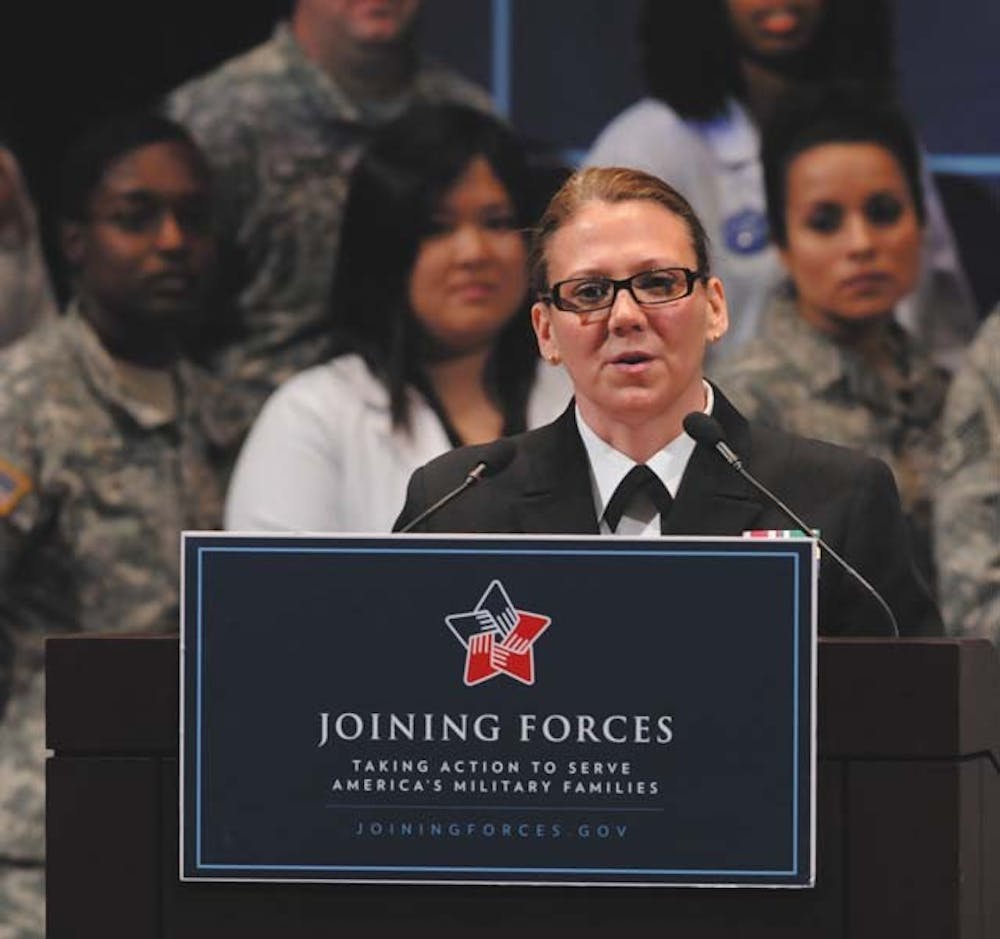If the walk from Hill House to Huntsman seems like too much, imagine commuting to Penn from North Carolina.
Navy Commander Pamela Herbig Wall is pursuing a doctorate in nursing at Penn while stationed with the 2nd Marine Division at Camp Lejeune in North Carolina. She Skypes and phones her doctoral committee and frequently flies to Philadelphia to guest lecture.
She recently won a Rear Admiral Mary Hall Award for Excellence in Publication for her synthesis of literature entitled “Post-Traumatic Stress Disorder and Traumatic Brain Injury in Current Military Populations: A Critical Analysis.” It was published in 2012 in the Journal of the American Psychiatric Nurses Association.
Wall concluded that when a patient has both post-traumatic stress disorder and has experienced a traumatic brain injury, he or she is more likely to experience post-concussive symptoms. According to Wall’s analysis, PTSD plays a larger role in causing these symptoms than TBI on its own.
“The longevity and severity of the [post-concussive] symptoms are more attributed to PTSD than TBI,” she said.
This paper then served as Wall’s qualifying exam to receive her doctorate in nursing. According to Wall, every nursing doctoral student designs his or her own exam, which is then vetted by the nursing faculty.
Wall chose to do a synthesis of literature, which will become part of a chapter of her doctoral thesis: “Mental Disorders and TBI in Deployed Military Service Members.”
Navigating a path
Related
4/10/13: Living life, one letter at a time
Wall’s path to a doctorate in nursing has been unusual.
As an undergraduate at Truman State University, she studied history. But after graduation, Wall worked at an emergency room outside of Chicago. Her experiences as a unit clerk and an E.R. technician convinced her to go back to school and study nursing.
“I enjoyed working with the doctors. I enjoyed working with the nurses,” Wall said. It was a great place to learn … I saw a little bit of everything … you name it, it came through the door.”
After graduating from nursing school in 1996, Wall decided to join the Navy, as many of her family members had. “I was faced with working locally or really traveling and experiencing different things [as a part of the armed services],” she said.
After joining the Navy, Wall w pursued mental health nursing, working at hospitals all over the United States — including California, Guam, Virginia and Maryland — moving every two to three years.
While working as a Navy nurse, Wall pursued her master’s and doctoral degrees in psychiatric-mental health nursing at Penn’s School of Nursing.
According to nursing professor Nancy Hanrahan, Wall’s path is not out of the ordinary.Five to 10 nurses in the armed forces — which, according to 2010 Senate Appropriations Committee reports, contained nearly 3,000 nurses — matriculate at Penn each year.
Teaching about PTSD
After becoming a doctoral student at Penn, Wall began guest lecturing. This summer, she lectured about PTSD in Hanrahan’s course “Psychiatric Mental Health Nursing.” When lecturing, she stressed the importance of knowing the chemical changes in the brain that are part of PTSD.
“There are all sorts of neurotransmitters involved with PTSD,” she said. “If you just say [to students] ‘these are the symptoms and these are the treatments,’ you’re missing a piece.”
After completing her service in the Navy, Wall hopes to become a professor, continuing to lecture and teach.
“I love teaching,” she said. “It is the brightest part of my day.”
Hanrahan praised Wall’s teaching ability.
The students “always love” her lectures, Hanrahan said. “Pam is a very dynamic lecturer and everything is based on some story … in the real world.”
For example, Wall brings a PTSD therapy dog to lectures to show students that animals are being used in hospitals to help people with PTSD. “Her students love it,” Hanrahan said.
Wall’s guest lecturing is part of a nationwide effort to educate nursing students about PTSD. In April of 2012, First Lady Michelle Obama and Second Lady Jill Biden came to the Nursing School to announce an initiative of Joining Forces, which is a program that supports the health care needs of members of the military and their families. The initiative was to research, treat and educate nursing students about PTSD. Wall spoke at the event and introduced the First Lady.
Both Hanrahan and nursing professor Therese Richmond, Wall’s advisor and dissertation chair, stressed that it is important for nursing students to understand PTSD.
“It is very important for all nurses to be knowledgeable about the psychiatric consequences of war,” Richmond said in an email. “These can be quite disabling and it is very important that we diagnose these health issues and help affected men and women get treatment.”
Related
4/10/13: Living life, one letter at a time



